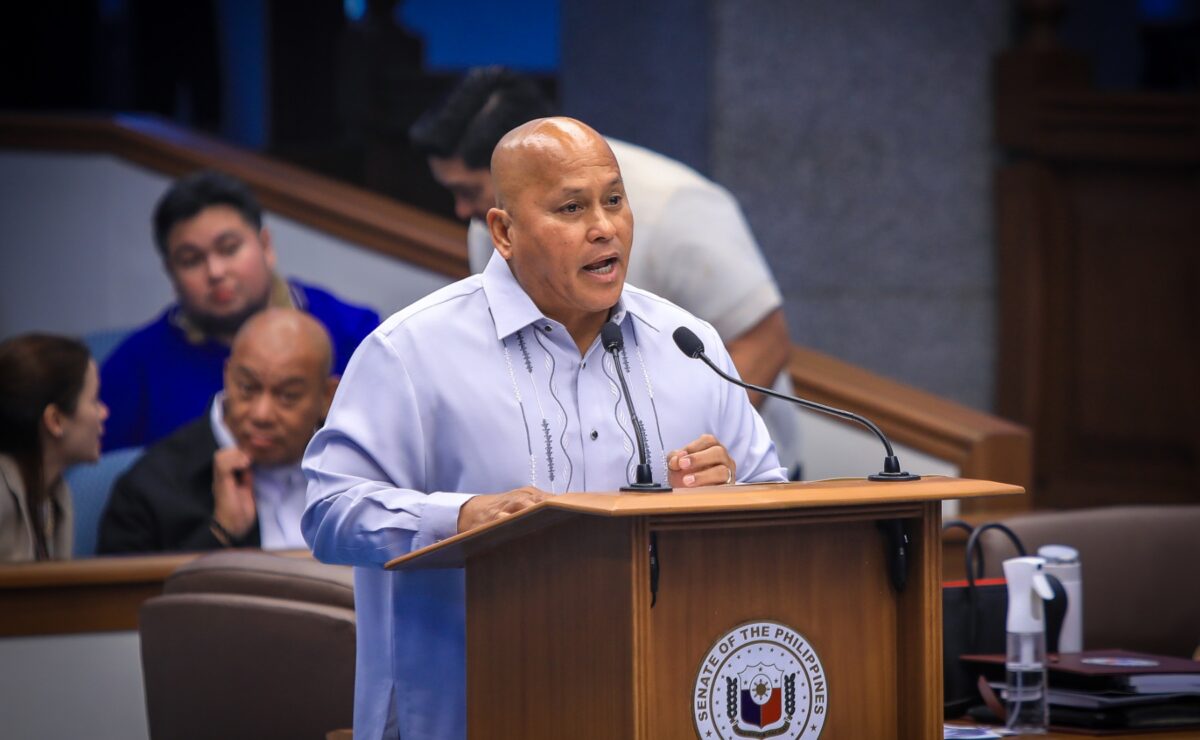
Sen. Ronald “Bato” Dela Rosa questions the legality and ethical aspects of the agreement signed by the Philippine Health Insurance Corporation (Philhealth), Development Bank of the Philippines (DBP), and Tingog Party-list (Tingog) dubbed “Maalagang Republika: Rural Financing Health Development Program” durina privilege speech on Wednesday, December 11, 2024. (Senate Public Relations and Information Bureau)
MANILA, Philippines — Sen. Ronald “Bato” dela Rosa questioned the legality of the agreement between the Philippine Health Insurance Corporation (PhilHealth), Development Bank of the Philippines (DBP), and Tingog Party-list on the construction of hospitals and clinics nationwide.
In a privilege speech during the Senate’s plenary session Wednesday, dela Rosa said the agreement is meant to pave the way for the Rural Financing Health Development Program.
Citing a circulating unsigned copy of the memorandum of agreement (MOA) between PhilHealth, DBP, and Tingog, the senator said the program intends to address gaps in healthcare infrastructure in rural areas.
“Iyan daw po ang tawag nila sa proyekto na kanilang gustong iimplementa sa bisa ng kanilang naging kasunduan. Mas maraming health facilities sa rural areas, realization ng Universal Health Care Act, at reduction ng mortality at morbidity rates sa pamamagitan ng pagtatayo ng primary health care facilities ang kanilang layunin,” he said.
(They say that’s the program they want to implement according to their agreement. They want more health facilities in rural areas, realizing the Universal Health Care Act, and reducing mortality and morbidity rates by putting up primary health care facilities.)
However, dela Rosa smelled something fishy about the pact.
“Bakit kaya mas pinili ng DBP at PhilHealth na makasama sa kanilang MOA ang isang Partylist kaysa sa Department of Health (DOH)? Gusto ko rin pong malinawan,” he said.
(Why did DBP and PhilHealth partner with a partylist instead of the DOH?)
READ: Romualdez, Tingog party-list to provide aid to Mindanao quake victims
According to the senator, the DOH has the mandate to provide technical assistance, consultation, and advisory services to stakeholders regarding the regulation of health facilities. He added that the DOH issues the “Certificate of Need” whenever a government or private entity desires to establish a new hospital.
“Sa isang banda, nakakapagtaka rin po kung bakit hindi rin mas pinili ng DBP at PhilHealth ang Department of Interior and Local Government (DILG) na siyang may mandato to exercise general supervision over local government units?” dela Rosa further asked.
(On the one hand, it is also surprising why DBP and PhilHealth did not prefer the Department of Interior and Local Government, which has the mandate to exercise general supervision over local government units.)
He likewise expressed doubts whether Tingog Partylist can assist and coordinate with local government units in ensuring their participation in the program intended to rehabilitate, expand, or construct hospitals – more than the DOH and DILG can.
READ: Romualdez, Tingog party-list facilitate release of P117-M aid to typhoon-hit areas
“Ang tanong ng lahat sa kasunduan na pinirmahan ng PhilHealth, DBP, at Tingog Partylist: Legal ba ito? Ethical ba ito? Hinaluan at hahaluan ba ng politika ang mga programang pangkalusugan? Masasabi ba natin na ito’y purong etikal at legal, at walang halong adyendang pulitikal? Mayroon po bang nalalabag na batas kagaya ng mga paratang ng ibang mga nakapansin sa timing ng programang ito?” asked dela Rosa.
(The question is whether the agreement signed by PhilHealth, DBP, and Tingog Partylist is legal. Is it ethical? Does this conceal a political agenda hidden in the form of a health program? Can we say that this is purely ethical and legal without the trace of political agenda? Did this violate a law, similar to what was pointed out by those who first noticed this program?)
Dela Rosa then clarified that he is not opposing a program meant to help Filipinos, but that he only wants the process to be in accordance with the law.
“Nakakalungkot po na tila inaasa sa pulitika ang kalusugan ng ating mga mamamayan. Samantalang ito ay isang batayang karapatan na hindi na dapat ipinanlilimos kanino man,” he concluded.
(It is sad that the health of our citizens seems to depend on politics. This is a basic right that should not be begged to anyone.)